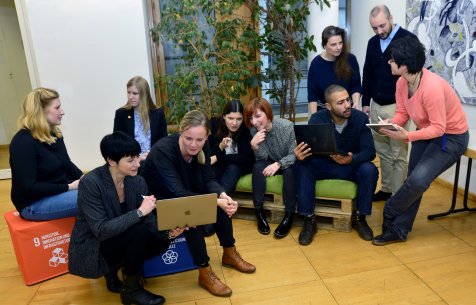Research Department Innovation, Space & Culture

A new understanding of innovation lies at the core of the research department’s scientific work. Our focus is the contribution of innovation in coping with the pressing challenges facing societies worldwide. It is about the interplay of the technological, economic, social and political aspects of innovation. Innovations focusing solely on technological advances are no longer sufficient in creating sustainable responses to challenges such as globalisation, demographic change, migration, resource efficiency and energy transition, health, education and quality of life.
Although recent debates on social innovation called attention to the limitations of traditional approaches, we now need a discussion that is open and not driven by ideology if we are to allow all ideas to be heard. Social and technological innovations are often closely related. Yet, by virtue of the complexity and interdisciplinary nature of social and technological innovations their sustained implementation also calls for policy reforms and public sector innovations.
Thematic Priorities
(1) Variation in Innovation Strategies and Processes
A future-oriented innovation concept should go beyond the dominant triple helix approach based on interaction between industry, science and policy. A fundamental shift in thinking innovation is required: (i) from single-ended supply-side to a societal demand-driven approach, (ii) from a delimited actor constellation to the involvement of citizens, customers and/or other parties concerned, while (iii) building capacity in terms of necessary network structures and underlying social capital.
(2) Role of Innovation Stakeholders’ Cultural Embeddedness – Towards an New Innovation Culture
Innovation refers to the «New» and the «New» always brings change and conflicts. A new innovation concept requires a cultural frame which is open to experimentation, regards failure as a step towards new trajectories and is able to learn and terminate failed trials without negative implications. Such a cultural framework must be based on mutual trust and social capital while being interdisciplinary in makeup and able to withstand conflicts.
(3) Spatial Context’s Role for Innovativeness
The «New» originates from the small scale and is locally situated in open cultural contexts. Over recent years, cities and regions have become fields of experimentation for distinct forms of collaboration, new innovation strategies and new societal problem-solving. Terms such as «smart city», «innovation cities», «FabLab City», «resilience» or «transition» point to the search for new solutions on the ground. They also illustrate that there is still a long way to go, not least because multilevel governance seeks the broad (e.g. Europe-wide) diffusion and application of regionally developed concepts and acquired experiences.
Activities
The research department’s research activities in line with its thematic priorities comprise:
- Theoretical work on the interplay of innovation, space and culture;
- Empirical analysis of new innovation strategies at the micro-level in organisations (e.g. enterprises, economic development agencies) and networks (e.g. clusters), the meso-level (cities, regions and cross-regional), and at European scale;
- Elaboration of new innovation concepts;
- Piloting of concepts in the framework of regional development strategies, local and regional economic development strategies and structural policies;
- Evaluation of innovation programmes and projects;
- Support for innovation stakeholders through coaching, strategic consultation and policy advice.
Theoretical Underpinnings
The work of the research department is interdisciplinary and based on different theoretical approaches. Understanding societal change as a continuous long-term process suggests the application of dynamic theories such as evolutionary and process-analytical approaches. These are complemented by spatial theory (spacing, framing), spatial planning (spatial types, distinctiveness), the sociology of knowledge and theory of science (communities of practice, social capital), management and economic approaches (knowledge sharing, open innovation, effectual logic), theories of governance (multi-level governance), economic geography (clusters, agglomerations, milieus), as well as communication sciences (branding, symbolic capital).
Research Team
In line with the interdisciplinary research approach, the team represents different disciplines: social sciences (political sciences, sociology), spatial planning, geography, information sciences, communication sciences, management and economics. Research fellows from different societal and disciplinary fields complement the breadth of competences within the research department. Cooperation in regional and European research and through practitioner networks guarantees continuous interdisciplinary exchange and broadens the scope for diffusing research results.
